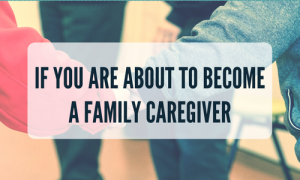The role of a family caregiver is incredibly extensive. From taking care of day-to-day tasks to managing pain and side effects, caregiving for a loved one is definitely not a menial task. Hence, a reliable and responsible family caregiver is crucial for the physical and emotional well-being of patients.
Having to care for a loved one as an individual without formal caregiving training can be overwhelming. You will have to pack your schedule to juggle between personal duties, caring for your loved ones, while still meeting the needs of other family members. Caregiving seems daunting. However, there are ways to make the process easier.
Here are 5 things to think about:

Managing your own mental and physical health
While the area of focus may be largely for cancer patients, family caregivers are as susceptible to stress and distress too. According to the family caregiver alliance, 20% of family caregivers suffer from depression, twice the rate of the general population. Caregivers often have to sacrifice their own emotional and physical needs in order to provide the best care for their ill loved one. This may lead to strain and stress, resulting in negative emotions such as isolation, anxiety and helplessness. Yet, caregiver burnout is often overlooked. It creeps up on you unnoticeably. Hence, many dub it as the ‘silent health crisis’. Caregiver depression is not uncommon, but definitely preventable if you take care of yourself.
2. Framing a positive mindset
Firstly, it will help to frame a positive mindset for you as a caregiver. Despite the shock and pessimism from receiving news of a loved one getting cancer, caregiving is a fulfilling and meaningful role. Taking care of a close family member or friend can make you feel needed. Many caregivers thrive on accomplishing things they never even knew they were capable of, and learning about the healthcare medication and the emotional needs of cancer patients. Entering a caregiving role with an open and empathetic mind will help loads!
3. Taking care of yourself
Taking time for yourself from time to time is important too. There are many ways to help reduce stress and prevent a buildup of depression over time. For example, regular exercise and physical activities can produce endorphins that act as natural painkillers. A healthy diet accompanying exercise can also keep the body and mind happy. If you require a short break, engaging in in-home, on-demand quality palliative care or respite care professionals can step in while you are away.
4. Seek professional homecare support
Caregiving is definitely not a simple task and can be overwhelming at times of critical needs. Seeking professional caregiver services can be a way to help alleviate your burden, and can also provide your family with the right knowledge and skills required to better care of your loved ones. There are many in-home, on-demand quality palliative care or respite services that you can engage in to ease your burdens. Apart from hospitals and in-facility care, alternative forms of care such as decentralised in home healthcare is a popular way to ensure quality caregiving and nursing services, while still allowing the patient to rest in the comforts of their own homes. This can provide more convenience and an ease of mind for you and your family.
Furthermore, in-home healthcare professionals can also establish valuable rapport with the patient and your family, and gain the trust of your household. Such external support can bring in a wave of support and relief with the added bonus of strong nursing and caregiving knowledge and formal education!
5. Finding support
Lastly, the support from family, friends and organisations that specialise in easing caregiver distress is important to help you strike a balance in your life. Many caregivers often bring it upon themselves as the sole caregiver of his or her sick loved one. This will result in feelings of isolation and helplessness as you feel like you ‘have to do everything yourself’. Many also feel guilty whenever they feel like tapping out or giving up altogether. However, this does not have to be the case if you find the necessary support to keep you going.
There are many organisations that bring caregivers together and provide necessary homecare support and resources required for palliative care. For example, HCA Hospice caregivers connect, TOUCH caregivers support and AWWA Caregivers support. Talking to other caregivers who face similar circumstances as you can provide solutions and ease your loneliness. Being in a like-minded community whether online or offline can also provide practical advice and relief through testimonials of shared experiences. You do not have to be alone in your journey as a caregiver because there are many like you too.
All in all, a family caregiver is the lifeline of a chronically ill patient. He or she has a huge influence on how their loved ones cope with their illnesses, playing an integral role in helping a patient stick with their treatment plan, helping them get enough rest, and getting taken care of. It is one of the most meaningful and fulfilling roles, to be able to touch the lives of another. If you are about to become a family caregiver, take note of these steps and you will be well on your way to providing the best care support for your loved ones.
Award winning Home Care trusted by health professionals – Jaga-Me




